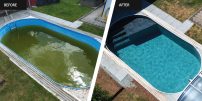A lawsuit involving two individuals who suffered chemical burns from overchlorination in a spa has sparked concerns about a Rola-Chem feeder.
In September 2008, Sophia Seddiqi and Russell Detar used an inground spa at the condominium complex where they lived in Southern California. They later suffered severe pain and blistering, which turned out to be second-degree burns.
Detar required hospitalization, with burns from his knees to his ankles, said Michael Terhar of LaMontagne & Terhar, LLP, in Pasadena, Calif., who represented the service firm that maintained the spa. Detar’s burns also resulted in permanent scarring and hair loss from the chest down, while Seddiqi suffered severe chemical burns to her calves and ankles, Terhar added. In his complaint, Detar characterized his injuries as permanent.
Detar and Seddiqi originally filed suit against the service firm, the homeowners association and the property management company. The service firm, Santa Ana, Calif.-based Aquatic Balance, then filed a cross complaint against Rola-Chem Corp. and its parent company, Specialty Manufacturing Corp. Both firms then were added as defendants to the original lawsuit and other cross complaints.
Though all defendants denied liability, both suits settled, with various defendants paying undisclosed amounts.
Those suing Rola-Chem contended that the RC-25/50 peristaltic chemical pump that sanitized the spa was set in “timer” mode, whereby the feeder periodically injects a set dosage of sodium hypochlorite into the water, but that it behaved as if it were in the “on” position and continuously pumped the substance. Up to 5 gallons of chlorine — the amount stored in a container holding the chemical — was fed into a spa estimated at 800 gallons, said Raymond Arouesty, president of Arrow Insurance Service Inc. in Simi Valley, Calif., the insurance firm covering Aquatic Balance.
Terhar, who represented Aquatic Balance, said the chemical levels weren’t known. A neighbor who works as a service technician took chemical readings the day after the incident, but the levels were too high to register on the test kit, the attorney said.
The plaintiffs claimed that the product was defective.
During the proceedings, Rola-Chem contended that this model of chemical feeder was not meant to be used outdoors, according to Terhar. However, he countered that the instructions merely said to install the devices in a sheltered location. The feeder in question was placed in a concrete-walled pump room with a lattice top and a door. “It was in a protected location, but not a waterproof location,” Terhar said.
The manufacturer’s attorney said it remains unclear exactly why the device continuously fed chlorine into the water, because the service technician threw away the solid-state switch and potentiometer, which would have served as evidence.
“It’s impossible to conclude why the litigated chlorinator failed,” said Carole Bos of Bos & Glazier, PLC, in Grand Rapids, Mich. “Perhaps someone accidentally placed it in the ‘on’ position — fully intending to return it to ‘timer’ mode — then got distracted with something else. Perhaps the chlorinator mysteriously went from ‘timer’ to ‘on’ mode, but if it did, we’d need the evidence to understand why that happened.”
It was this lack of clarity, she said, that motivated Rola-Chem to settle. “I don’t like trying cases when the best evidence is speculation,” she said. “It made sense, therefore, to resolve this matter.”
However, some parties are concerned that the issue goes beyond this individual case.
Some claimed to have witnessed other instances where that model of chemical feeder failed in the same manner. “We had anecdotal evidence of a number of these failures as we started talking to other people in the industry,” Terhar said. “I was aware of at least one other witness who reported more than a dozen of these failures in a similar manner.”
Bos said Rola-Chem has received no such complaints. “Before this litigation, no one had ever returned a chlorinator to the company with a report that it had been set in ‘timer’ mode, but failed in the ‘on’ position …” she said. “As a result, Rola-Chem never had the opportunity to examine an allegedly failed chlorinator to determine what may have caused the problem.”




